I found a heavy weight answer to your question that uses IL beside reflection. The idea is to obtain body of parent method, that invokes child method, that we want to dump. From reflection we are able to obtain array of IL bytes, which we can read and turn back into appropriate method invocations along with the runtime values of their generic parameters.
The below is a simplified result code based on your sample:
using System;
using System.Collections.Generic;
using System.Diagnostics;
using System.Linq;
class Program
{
static void Main()
{
Load(new Respository<int>());
Load(new Respository<string>());
Console.ReadLine();
}
class Respository<T> { }
static List<T> Load<T>(Respository<T> repository)
{
Dump(); // <-- Just dump this
return default(List<T>);
}
static void Dump()
{
// Get the method that invoked the method being dumped
var callerFrame = new StackFrame(2);
var callerMethod = callerFrame.GetMethod();
// Get the method that is being dumped
var calleeFrame = new StackFrame(1);
var calleeMethod = calleeFrame.GetMethod();
// Should return one value
var callees = from il in new ILReader(callerMethod).OfType<InlineMethodInstruction>()
let callee = callerMethod.Module.ResolveMember(il.Token)
where callee.Name == calleeMethod.Name && il.Offset == callerFrame.GetILOffset()
select callee;
Console.WriteLine(callees.First());
}
}
Notice:
- Dump() doesn't need any arguments.
- ILReader is a finished version of a class created by Haibo Luo in his webblog under the article titled Read IL from MethodBody.
The below is a simple completion of Luo's class along with satelite objects:
using System;
using System.Collections.Generic;
using System.Reflection;
using System.Reflection.Emit;
abstract class ILInstruction
{
}
class SimpleInstruction : ILInstruction
{
public string Name { get; private set; }
public SimpleInstruction(string name)
{
Name = name;
}
public override string ToString()
{
return GetType().Name + " " + Name;
}
}
abstract class MethodBaseInstruction : ILInstruction
{
public MethodBase Method { get; private set; }
public MethodBaseInstruction(MethodBase method)
{
Method = method;
}
public override string ToString()
{
return GetType().Name + " " + Method.Name;
}
}
class InlineNoneInstruction : MethodBaseInstruction
{
public int Offset { get; private set; }
public OpCode OpCode { get; private set; }
public InlineNoneInstruction(MethodBase method, int offset, OpCode opCode)
: base(method)
{
Offset = offset;
OpCode = opCode;
}
public override string ToString()
{
return base.ToString() + " " + Offset + " " + OpCode;
}
}
class ShortInlineBrTargetInstruction : InlineNoneInstruction
{
public sbyte ShortDelta { get; private set; }
public ShortInlineBrTargetInstruction(MethodBase method, int offset, OpCode opCode, sbyte shortDelta)
: base(method, offset, opCode)
{
ShortDelta = shortDelta;
}
public override string ToString()
{
return base.ToString() + " " + ShortDelta;
}
}
class InlineMethodInstruction : InlineNoneInstruction
{
public int Token { get; private set; }
public InlineMethodInstruction(MethodBase method, int offset, OpCode opCode, int token)
: base(method, offset, opCode)
{
Token = token;
}
public override string ToString()
{
return base.ToString() + " " + Token;
}
}
class InlineSwitchInstruction : InlineNoneInstruction
{
public int[] Deltas { get; private set; }
public InlineSwitchInstruction(MethodBase method, int offset, OpCode opCode, int[] deltas)
: base(method, offset, opCode)
{
Deltas = deltas;
}
public override string ToString()
{
return base.ToString() + " " + string.Join(", ", Deltas);
}
}
class ILReader : IEnumerable<ILInstruction>
{
Byte[] m_byteArray;
Int32 m_position;
MethodBase m_enclosingMethod;
static OpCode[] s_OneByteOpCodes = new OpCode[0x100];
static OpCode[] s_TwoByteOpCodes = new OpCode[0x100];
static ILReader()
{
foreach (FieldInfo fi in typeof(OpCodes).GetFields(BindingFlags.Public | BindingFlags.Static))
{
OpCode opCode = (OpCode)fi.GetValue(null);
UInt16 value = (UInt16)opCode.Value;
if (value < 0x100)
s_OneByteOpCodes[value] = opCode;
else if ((value & 0xff00) == 0xfe00)
s_TwoByteOpCodes[value & 0xff] = opCode;
}
}
public ILReader(MethodBase enclosingMethod)
{
this.m_enclosingMethod = enclosingMethod;
MethodBody methodBody = m_enclosingMethod.GetMethodBody();
this.m_byteArray = (methodBody == null) ? new Byte[0] : methodBody.GetILAsByteArray();
this.m_position = 0;
}
public IEnumerator<ILInstruction> GetEnumerator()
{
while (m_position < m_byteArray.Length)
yield return Next();
m_position = 0;
yield break;
}
System.Collections.IEnumerator System.Collections.IEnumerable.GetEnumerator() { return this.GetEnumerator(); }
ILInstruction Next()
{
Int32 offset = m_position;
OpCode opCode = OpCodes.Nop;
Int32 token = 0;
// read first 1 or 2 bytes as opCode
Byte code = ReadByte();
if (code != 0xFE)
opCode = s_OneByteOpCodes[code];
else
{
code = ReadByte();
opCode = s_TwoByteOpCodes[code];
}
switch (opCode.OperandType)
{
case OperandType.InlineNone:
return new InlineNoneInstruction(m_enclosingMethod, offset, opCode);
case OperandType.ShortInlineBrTarget:
SByte shortDelta = ReadSByte();
return new ShortInlineBrTargetInstruction(m_enclosingMethod, offset, opCode, shortDelta);
case OperandType.InlineBrTarget: Int32 delta = ReadInt32(); return new SimpleInstruction(delta.ToString());
case OperandType.ShortInlineI: Byte int8 = ReadByte(); return new SimpleInstruction(int8.ToString());
case OperandType.InlineI: Int32 int32 = ReadInt32(); return new SimpleInstruction(int32.ToString());
case OperandType.InlineI8: Int64 int64 = ReadInt64(); return new SimpleInstruction(int64.ToString());
case OperandType.ShortInlineR: Single float32 = ReadSingle(); return new SimpleInstruction(float32.ToString());
case OperandType.InlineR: Double float64 = ReadDouble(); return new SimpleInstruction(float64.ToString());
case OperandType.ShortInlineVar: Byte index8 = ReadByte(); return new SimpleInstruction(index8.ToString());
case OperandType.InlineVar: UInt16 index16 = ReadUInt16(); return new SimpleInstruction(index16.ToString());
case OperandType.InlineString: token = ReadInt32(); return new SimpleInstruction("InlineString" + token.ToString());
case OperandType.InlineSig: token = ReadInt32(); return new SimpleInstruction("InlineSig" + token.ToString());
case OperandType.InlineField: token = ReadInt32(); return new SimpleInstruction("InlineField" + token.ToString());
case OperandType.InlineType: token = ReadInt32(); return new SimpleInstruction("InlineType" + token.ToString());
case OperandType.InlineTok: token = ReadInt32(); return new SimpleInstruction("InlineTok" + token.ToString());
case OperandType.InlineMethod:
token = ReadInt32();
return new InlineMethodInstruction(m_enclosingMethod, offset, opCode, token);
case OperandType.InlineSwitch:
Int32 cases = ReadInt32();
Int32[] deltas = new Int32[cases];
for (Int32 i = 0; i < cases; i++) deltas[i] = ReadInt32();
return new InlineSwitchInstruction(m_enclosingMethod, offset, opCode, deltas);
default:
throw new BadImageFormatException("unexpected OperandType " + opCode.OperandType);
}
}
Byte ReadByte() { return (Byte)m_byteArray[m_position++]; }
SByte ReadSByte() { return (SByte)ReadByte(); }
UInt16 ReadUInt16() { m_position += 2; return BitConverter.ToUInt16(m_byteArray, m_position - 2); }
UInt32 ReadUInt32() { m_position += 4; return BitConverter.ToUInt32(m_byteArray, m_position - 4); }
UInt64 ReadUInt64() { m_position += 8; return BitConverter.ToUInt64(m_byteArray, m_position - 8); }
Int32 ReadInt32() { m_position += 4; return BitConverter.ToInt32(m_byteArray, m_position - 4); }
Int64 ReadInt64() { m_position += 8; return BitConverter.ToInt64(m_byteArray, m_position - 8); }
Single ReadSingle() { m_position += 4; return BitConverter.ToSingle(m_byteArray, m_position - 4); }
Double ReadDouble() { m_position += 8; return BitConverter.ToDouble(m_byteArray, m_position - 8); }
}

